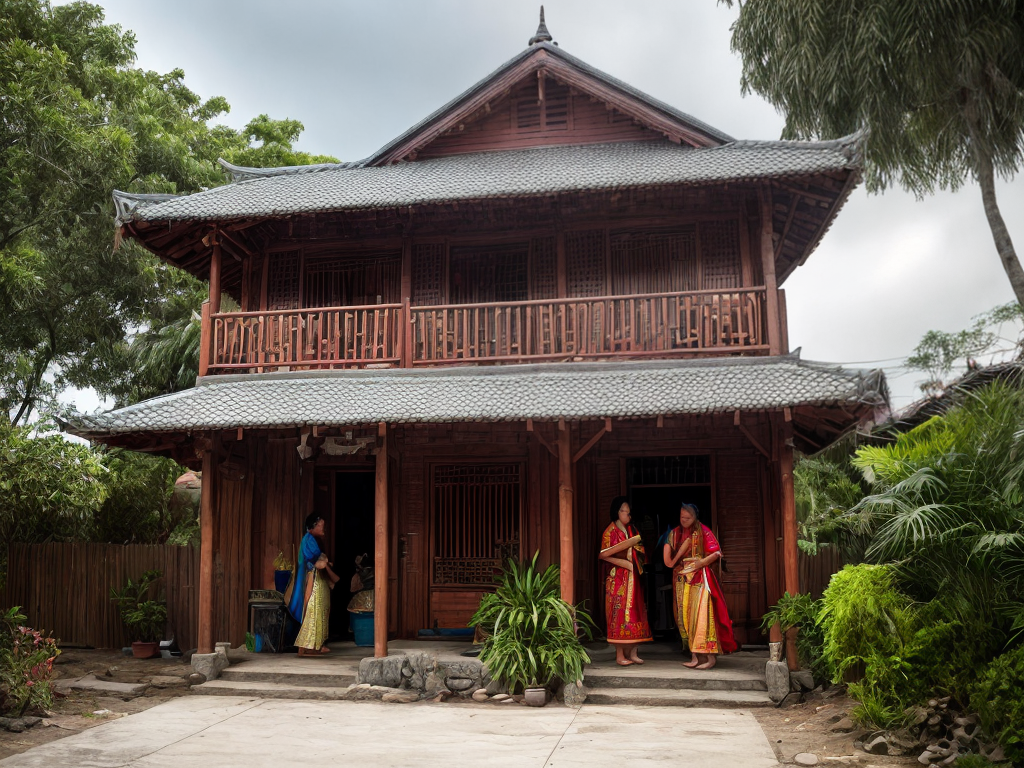
Moving into a new house is like opening a brand new book, full of undiscovered stories and adventures waiting to unfold. But did you know that in Filipino tradition, there are certain rituals and practices that are believed to bring good luck, protection, and prosperity to the new home? From blessing the house with holy water to hanging a buri leaf on the front door, these traditions have been passed down from generation to generation. So, if you’re curious to learn more about the fascinating Filipino traditions when moving to a new house, keep reading to discover the secrets behind these age-old customs.
Blessing the New Home With Holy Water
When moving into a new home in the Philippines, one important tradition is the blessing of the house with holy water. This ritual is deeply rooted in Filipino culture, where the use of holy water for cleansing and purification holds great significance. As I stood in my new home, surrounded by the excitement of a fresh start, I eagerly awaited the arrival of the priest who would perform the blessing.
The priest arrived with a small container filled with holy water, a symbol of God’s grace and protection. He began by sprinkling the holy water in every room, reciting prayers for blessings, good fortune, and protection from evil. The sound of the water hitting the walls and floors filled the air, creating a sense of calm and serenity. It was believed that the holy water would cleanse the house of any negative energy and bring forth positive energy and harmony.
The significance of holy water in Filipino culture goes beyond the physical act of cleansing. It represents a spiritual connection to God and the divine. It is a symbol of purity and serves as a reminder to live a virtuous life. The use of holy water in blessing a new home is a powerful tradition that brings a sense of peace and spiritual protection to both the house and its occupants.
Setting up an Altar for Spiritual Protection
When it comes to moving into a new home, one important aspect of Filipino tradition is setting up an altar for spiritual protection. The altar serves as a sacred space where prayers and rituals can be performed to ensure the home is shielded from negative energies. To create an altar, specific items like religious icons, candles, and blessed objects are carefully chosen and arranged. These items, along with the rituals and prayers conducted at the altar, play a vital role in safeguarding the household and promoting a sense of peace and harmony.
Importance of Altar
Setting up an altar for spiritual protection is a vital aspect of the Filipino moving house tradition. It is believed that by creating this sacred space, we invite positive energy and divine blessings into our new home. The altar serves as a focal point for prayers, meditation, and connecting with the spiritual realm. Here’s why the altar holds such importance:
-
Altar Decoration: The items placed on the altar, such as religious icons, candles, and flowers, serve as symbols of faith and devotion. They create a serene and sacred atmosphere that promotes spiritual growth and protection.
-
Spiritual Significance: The altar represents a connection between the physical and spiritual realms. It acts as a conduit for divine energy, providing a spiritual shield against negative influences and attracting blessings and abundance.
-
Powerful Intentions: By setting up an altar, we set our intentions for a harmonious and prosperous life in our new home. It serves as a reminder to stay focused on our goals and seek guidance from a higher power.
-
Family Unity: The altar also fosters a sense of unity and togetherness within the family. It becomes a central space where family members can gather, pray, and strengthen their bond, creating a harmonious and loving environment in the new house.
Setting up an altar for spiritual protection is not simply a decorative element but a powerful tool that helps us establish a sacred and harmonious space in our new home.
Items for Altar
To create a powerful and meaningful altar for spiritual protection, carefully selecting the right items is essential. Altar decorations play a significant role in Filipino traditions when moving to a new house. Each item on the altar holds deep symbolism and represents a connection to the divine. The most common items found on an altar include religious icons, such as statues of saints or the Virgin Mary, candles, flowers, and incense. These items serve as reminders of faith, strength, and protection. The candles symbolize light in the darkness, the flowers represent beauty and growth, and the incense purifies the space. By incorporating these items into the altar, one can create a sacred atmosphere and invite spiritual protection into their new home.
Rituals and Prayers
I love starting my day by carefully arranging the items on my altar, invoking spiritual protection, and setting the intention for a harmonious and blessed home. In Filipino culture, rituals and prayers play a significant role in moving to a new house. Here are four essential items that are commonly included on the altar:
-
Crucifix or religious image: This represents our faith and serves as a reminder of God’s presence in our lives.
-
Candles: Lighting candles symbolizes the light and guidance we seek from the divine. It also adds a peaceful ambiance to the space.
-
Holy water: Sprinkling holy water around the house is believed to cleanse it from negative energies and bless it with divine protection.
-
Offerings: Placing fruits, flowers, or food on the altar is a way of showing gratitude and respect to the spirits and ancestors who watch over our home.
Through these rituals and prayers, we seek blessings, protection, and a strong connection with the divine, ensuring a harmonious and blessed home for ourselves and our loved ones.
Inviting Family and Friends for a Housewarming Party
In the vibrant Filipino culture, a housewarming party serves as the perfect opportunity to gather loved ones and celebrate the beginning of a new chapter in one’s home. It is a joyous occasion filled with laughter, lively conversations, and delicious traditional Filipino food. When planning a housewarming party, it is important to create a warm and inviting atmosphere with the right housewarming decorations.
To set the mood, colorful banners, balloons, and streamers can be hung throughout the house. These decorations not only add a festive touch but also symbolize good luck and prosperity for the new home. As for the food, traditional Filipino dishes are a must-have. From mouthwatering adobo to crispy lechon, these dishes are sure to delight the taste buds of your guests.
In addition to the decorations and food, it is important to invite family and friends who have been a part of your journey. This is a time to express gratitude for their support and to share your excitement about your new home. By inviting them to your housewarming party, you are not only celebrating your new beginnings but also strengthening the bonds of love and friendship.
Seeking Blessings From Elders
When moving into a new house in the Philippines, seeking blessings from elders is an important tradition. Elderly blessing rituals play a significant role in Filipino culture, symbolizing respect for wisdom, experience, and the passing down of blessings to the next generation. These rituals highlight the cultural significance of elders in Filipino society and the importance of their guidance and wisdom in starting a new chapter in life.
Elderly Blessing Rituals
During the Filipino moving house tradition, it is customary to seek blessings from elders as a way to honor their wisdom and seek their guidance in the new chapter of life. This practice reflects the deep respect and importance placed on elderly wisdom and the ancestral connection that is believed to bring good fortune and protection to the new home.
-
Seeking Wisdom: Elders are seen as the keepers of knowledge and experience. Their blessings are sought to gain insights and guidance for a prosperous and harmonious life in the new home.
-
Ancestral Connection: The blessings of elders are believed to establish a strong connection to the ancestors, who are seen as spiritual guardians. This connection ensures protection, blessings, and a sense of belonging in the new space.
-
Rituals and Prayers: The blessings are often accompanied by rituals and prayers led by the elders. These rituals may include the sprinkling of holy water or the burning of incense to purify the new home and ward off negative energies.
-
Symbolic Gestures: Elders may also perform symbolic gestures during the blessing, such as placing their hands on the shoulders or heads of family members, signifying their support and love.
Seeking blessings from elders is not only a way to honor their wisdom but also to strengthen the ties between generations and create a sense of unity and harmony in the new home.
Role of Elders
Elders play a crucial role in the Filipino moving house tradition, as their blessings are sought to honor their wisdom and seek guidance for a prosperous and harmonious life in the new home. In Filipino culture, the role of ancestors is highly revered, and traditional beliefs dictate that seeking the blessings of the elders is essential for a smooth transition and a favorable future. The elders are seen as the keepers of wisdom and experience, embodying the values and traditions that have been passed down through generations. Their presence during the moving process symbolizes the continuity of the family and the connection to the past. By seeking their blessings, the younger generation acknowledges and respects their authority and seeks their guidance in navigating the challenges and opportunities that lie ahead. This age-old tradition reinforces the importance of intergenerational respect and the belief in the power of ancestral wisdom to shape the future.
Cultural Significance
The cultural significance of seeking blessings from elders in the Filipino moving house tradition is deeply rooted in the belief that their wisdom and guidance pave the way for a prosperous and harmonious future. This practice is not just a mere formality, but a way of honoring and respecting our elders, who hold a special place in our society. Here are four reasons why seeking blessings from elders holds such importance in Filipino culture:
-
Cultural practices: Seeking blessings from elders is a deeply ingrained cultural practice that has been passed down through generations. It reflects the importance of maintaining strong family ties and respecting the wisdom of our ancestors.
-
Symbolism: Blessings from elders symbolize the transfer of their knowledge, experiences, and good wishes to the younger generation. It is a way of seeking their guidance and protection as we embark on a new chapter in our lives.
-
Meaning: Seeking blessings from elders signifies the recognition of their contribution to our lives and the acknowledgement of their role as the keepers of our traditions and values.
-
Power of words: Elders hold a position of authority and their blessings carry weight and significance. Their words have the power to shape our future and bring us blessings and good fortune.
Hanging a Buri Leaf on the Front Door for Good Luck
Hanging a buri leaf on the front door is believed to bring good luck to Filipino households. This ancient tradition, rooted in cultural beliefs, holds great symbolism for the Filipino people. The buri leaf, which comes from the buri palm tree found abundantly in the Philippines, is seen as a powerful talisman that wards off negative energy and invites positive vibes into the home.
In Filipino culture, the buri leaf is considered a symbol of protection, fertility, and prosperity. By hanging it on the front door, we are not only inviting good luck into our homes, but also safeguarding our loved ones and ensuring a prosperous future. It is believed that the buri leaf acts as a shield, preventing any malicious spirits or negative influences from entering our sacred space.
This tradition has been passed down through generations, and it continues to be an important ritual when moving into a new house. As we hang the buri leaf on our front door, we are making a statement to the world that our home is a place of power and abundance. It serves as a constant reminder to ourselves and others that we are in control of our destiny and that we attract only the best into our lives.
Placing a Coconut on the Doorstep for Abundance
To continue the Filipino tradition of attracting abundance into our homes, another significant practice involves placing a coconut on the doorstep. This ancient custom is rooted in cultural beliefs and is believed to bring prosperity and good fortune to the household. Here’s why the coconut is considered a powerful symbol of abundance and how it is incorporated into this tradition:
-
Coconut offerings: The coconut is seen as a sacred fruit symbolizing fertility, abundance, and protection. Placing a whole coconut on the doorstep is an offering to the spirits and deities, inviting them to bless the home with prosperity and abundance.
-
Doorstep placement: The doorstep is believed to be the threshold between the outside world and the home. By placing a coconut on the doorstep, it acts as a guardian, protecting the household from negative energy and inviting positive vibes to enter.
-
Symbolic meaning: The coconut’s hard outer shell represents strength and resilience. It is believed that by placing a coconut on the doorstep, the household will be shielded from hardship and adversity, allowing abundance to flow freely.
-
Continuity of tradition: This practice has been passed down through generations, deeply embedded in Filipino culture. It serves as a reminder to honor and respect our ancestors and their wisdom, while also embracing the power of cultural traditions in our modern lives.
Lighting Candles to Ward off Negative Energy
When it comes to warding off negative energy, one powerful tradition in Filipino culture involves the lighting of candles. In the Philippines, cultural beliefs around negative energy protection are deeply rooted in symbolic practices. Lighting candles is seen as a way to create a positive and peaceful environment, while also warding off any negative influences.
In Filipino traditions, candles hold a special significance. They are believed to represent light, hope, and guidance. By lighting candles, it is believed that the positive energy they emit will counteract any negative energy present in the surroundings.
When moving to a new house, it is common for Filipinos to perform a ceremony where candles are lit in each room. This ritual is done to cleanse the space and create a harmonious atmosphere. The act of lighting candles not only serves as a practical tool for illumination, but also as a symbolic gesture to ward off any negative energy that may be lingering.
The tradition of lighting candles is not limited to moving houses. Filipinos also light candles during important life events and celebrations, such as birthdays, weddings, and religious ceremonies. It is a way to invite positive energy and blessings into their lives.
Conclusion
In conclusion, Filipino traditions when moving to a new house are filled with spiritual rituals and symbols that bring blessings, protection, and good luck. From blessing the home with holy water to setting up an altar for spiritual guidance, these practices create a sense of harmony and positive energy. Inviting loved ones for a housewarming party and seeking blessings from elders further enhance the joy and prosperity of the new home. With buri leaves for good luck and coconuts for abundance, and the warm glow of candles to ward off negativity, Filipino traditions truly create a vibrant and welcoming atmosphere in a new home.


